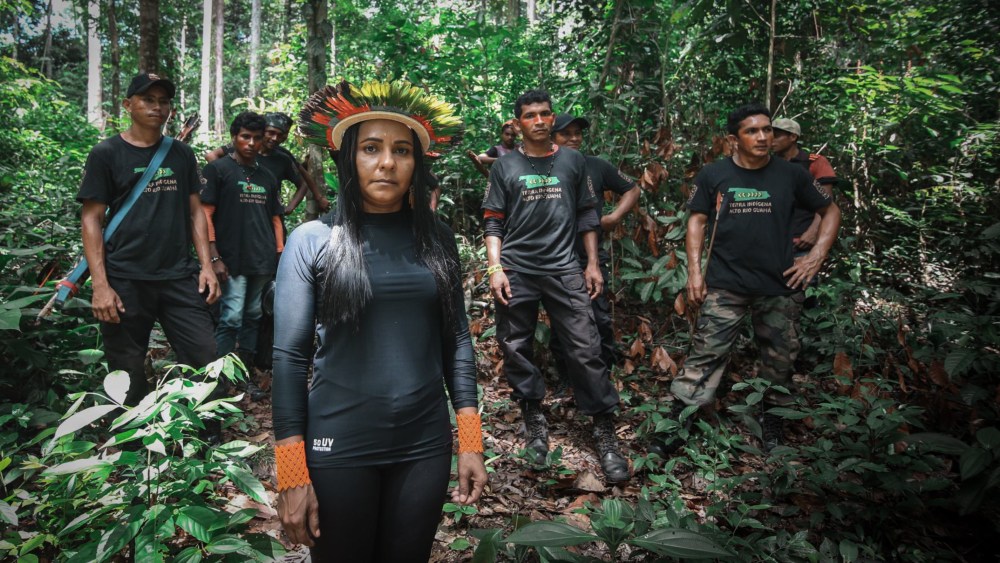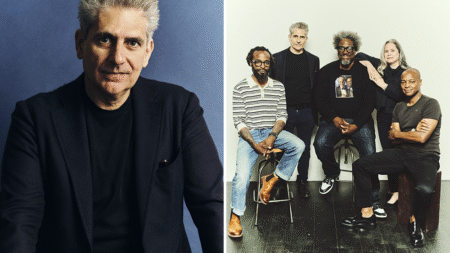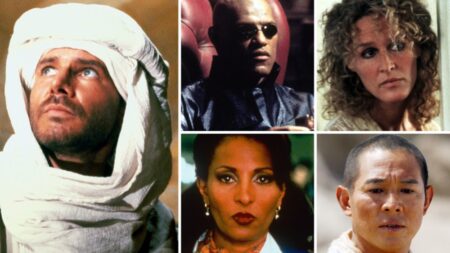In 2019, Edivan Guajajara, Chelsea Greene, and Rob Grobman began filming “We Are Guardians,” a documentary about Indigenous forest guardians fighting to protect their ancestral lands from relentless invasions and deforestation in Brazil’s Amazon rainforest.
The directors followed various forest guardians of Brazil as they fought to protect the Amazon rainforest from destruction.
“Through the smoke and confusion of the media coming from Brazil and the international community, we decided to mobilize and uncover the truth,” Greene and Grobman said in a joint statement.”We wanted to hear from those closest to the forest, and the fires, what was happening, from their perspective.”
After a year, Guajajara, Greene, and Grobman showed producers Zak Kilberg, Maura Anderson, and Fisher Stevens a reel of what they had captured in the Amazon. The producers, who at the time were forming their production company Highly Flammable, were immediately intrigued and decided to make “We Are Guardians” the shingle’s first project.
“I had worked in the Amazon with Leo ( DiCaprio) on a movie called ‘Before the Flood’ and I really wanted to do something in the environmental space again,” says Stevens, who won an Oscar in 2010 for producing the documentary “The Cove.” “When I saw the footage, I thought, ‘Okay, this will be good as long as we get the movie together,’ because the movie was a bit of a mess when we started. We also needed money.”
So, Stevens made some calls to streamers like Netflix, with whom the actor had worked with on docuseries including “Beckham” and “Tiger King.” Stevens also reached out to allies at Nat Geo, who distributed “Before the Flood,” and Discovery, who streamed two of Stevens’ environment-oriented docs – “Racing Extinction” and “Tigerland.
But there was a problem. Director Alex Pritz was making a film that was similar to “We Are Guardians,” called “The Territory.” About the tireless fight of the Amazon’s Indigenous Uru-eu-wau-wau people against the encroaching deforestation brought by Brazilian farmers and illegal settlers, “The Territory” would eventually premiere at the Sundance Film Festival in 2022.
When Nat Geo acquired “The Territory” out of Sundance, suddenly there wasn’t room for another doc about the crisis in the Amazon rainforest.
“We think of our film as a lensing up from “The Territory,”” says Anderson. “Sort of looking at the broader interconnectedness of the whole globe and the Amazon, whereas “The Territory” was really focused on the territory. I wish that distribution had seen it that way, because I think it could have continued the conversation that “The Territory” started in such an epic way. But, unfortunately, there is this mindset of like, “Well, we can only have one film from Brazil every five years.”
The filmmakers and Highly Flammable persevered. They raised funds and kept filming.
“We Are Guardians” eventually made its world debut at Canada’s Hot Docs in 2023. A festival run and an impact campaign kept the doc at various theaters across the country over the last two years.
“The focus is about localizing the interest and finding local guardians who are dealing with their own environmental issues in these various places,” says Kilberg. “Whether that’s California or North Carolina, almost every place in the country is being affected by climate change and environmental challenges.”
Kilberg adds, “The film is ultimately about activating guardians wherever you are, wherever you live, and showing that we need to come together, stand up, and fight back on these policies that are continuing to harm the environment.”
In April, after Leonardo DiCaprio’s Appian Way boarded “We Are Guardians” as executive producers, Area23a acquired the doc. It opens in Los Angeles on Friday and in New York on July 11.
Stevens admits that if he hadn’t had the financial security he was able to achieve by making “Beckham” for Netflix, he wouldn’t have been able to work on “We Are Guardians” or his most recent doc, “A King Like Me,” which follows members of New Orleans’ first Black Mardi Gras krewe.
“The way to continue doing these important social issue docs is you have to balance doing other (commercial) docs as a filmmaker,” says Stevens. “Because we are not going to get paid to do these social impact films, but we have to continue to make them.”
Read the full article here








